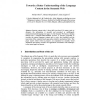617 search results - page 27 / 124 » Language Games, Natural and Artificial |
AIIDE
2008
14 years 5 days ago
2008
Children do not learn the meanings of words from parsing and understanding gigabytes of text; instead meanings are learned from competent speakers who relate language to what'...
ECAL
2007
Springer
14 years 1 months ago
2007
Springer
This paper presents computer simulations which investigate the effect that different group sizes have on the emergence of compositional structures in languages. The simulations are...
AI
2004
Springer
13 years 9 months ago
2004
Springer
Efficient Learning Equilibrium (ELE) is a natural solution concept for multi-agent encounters with incomplete information. It requires the learning algorithms themselves to be in ...
AIMSA
2004
Springer
14 years 3 months ago
2004
Springer
Internet content today is about 80% text-based. No matter static or dynamic, the information is encoded and presented as multilingual, unstructured natural language text pages. As ...
AI
2011
Springer
13 years 4 months ago
2011
Springer
Logical filtering is the process of updating a belief state (set of possible world states) after a sequence of executed actions and perceived observations. In general, it is intr...

